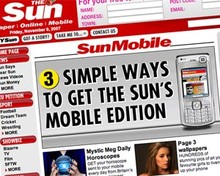
News providers are investing heavily in developing products and content for the mobile market, but is there the demand and technology to support it?
"News is fast becoming something that is gluing media owners' eyeballs to mobile," Brad Rees, managing director of mobile market and research company Mediacells, told Journalism.co.uk.
"News and sport are the two lowest common denominators of content. They have underpinned the web and now are underpinning mobile."
Rees is in no doubt the technology to provide content on mobiles is up to scratch. Mediacells forecasts that 70 per cent of devices in the UK market by 2008 will accommodate the mobile web, while 68 per cent of devices will work with Java - a function which has potential for news providers looking to develop a specific application for their mobile content.
The advent of the smartphone and what Rees describes as the 'prosumer' - a technically informed consumer with a disposable income - is building demand for media content that is instantly accessible and adapted to a mobile phone user.
"The technology has never been readier than it is now. Look at the way the operators are promoting this kind of mobile internet proposition," Rees explained.
Vodafone, for example, launched a £3.2 million digital advertising campaign to push the mobile web in June this year, while T-Mobile spent £3 million on promoting its 'web'n'walk' tariff.
Until recently, according to Rees, content was viewed from the operator's perspective, but cutbacks in editorial staff by operators and a reduction in investment in content development is shifting the focus onto more traditional content providers.
"In terms of the technology hurdles and obstacles, they are overcome from a network perspective. The big outstanding issue is over the optimisation of content," said Rees.
"Operators are trying to relieve themselves of the burden of content and pass that responsibility onto the media owners."
Passing on the baton of content to news groups has opened up the debate of how this content should be displayed. The idea of delivering content over an internet-type interface - providing users with a similar experience to surfing the web from a computer, as used by CNN - or a Java application.
"If you compare it to the internet days, you could say that the Java application represents the old AOL-walled garden approach, where you’d go in but it’s all very controlled," said Rees.
The advantages of news providers developing Java applications, Rees points out, is that it can be configured by the user to provide direct and easy access to news content.
Testing out all options, The Sun has pushed a range of mobile options to its audience, launching a Sun mobile site, making a Java application available and offering MMS alerts to T-Mobile customers.
This deal with T-Mobile is one of a number, according to Rees, that The Sun's owner Newsgroup has brokered with operators in a bid to get their content viewed.
Alternatively media owners looking to distribute their content on a mobile platform could buy network space wholesale from the operator - an unpopular option according to Rees:
"It goes against the ways in which media owners and operators have worked in the last four years, which is about revenue share.
"The operator takes a hit on the network costs while the content man takes a hit on the production costs of producing the content."
Central to choosing how to deliver content is audience access: if media groups form partnerships with operators they are forced to share and even lose viewers.
"The question is who will own the consumer. Mobile phone companies have got a kind of customer relationship whereas a media company would talk about an audience. Customer loyalty and audience loyalty are built on different things," said Rees.
It is arguably with the audience that the greatest limitation to news content on a mobile platform may lie.
"The limitations are basically people's reticence or mistrust to go out onto the wild frontier of the internet on their mobile phones. Everybody is very comfortable with the internet, it’s more to do with how much is it going to cost me? It's about 'operator data charges may apply'."
Research from Mediacells' own Mobile Consumer Forum has suggested a growing concern over data charges for content, which could impact upon the uptake of news content on mobiles.
Currently data tariffs are charged per kilobyte ranging from £1 per kilobyte with Orange or £3 to £7.50 on T-Mobile and operators promoting all-you-can-eat or flat-rate tariffs have been criticised for including an upper limit for downloading content.
The future of data charging and the challenge of operators to make money from the increasingly tech-savvy consumer are directly linked to the obstacles faced by media owners who want to go mobile, according to Rees.
"The future of mobile operators remains as the key to success for the media owners as well."
Free daily newsletter
If you like our news and feature articles, you can sign up to receive our free daily (Mon-Fri) email newsletter (mobile friendly).









